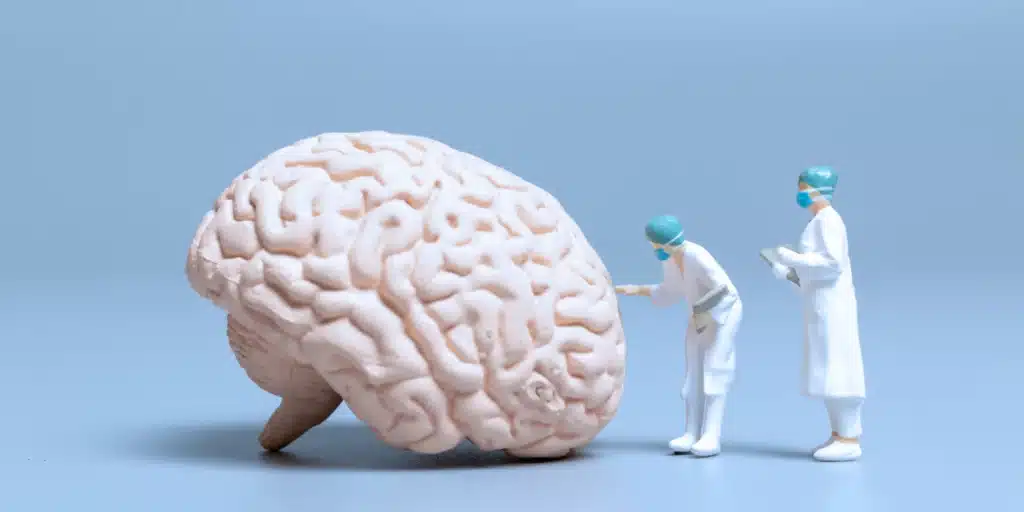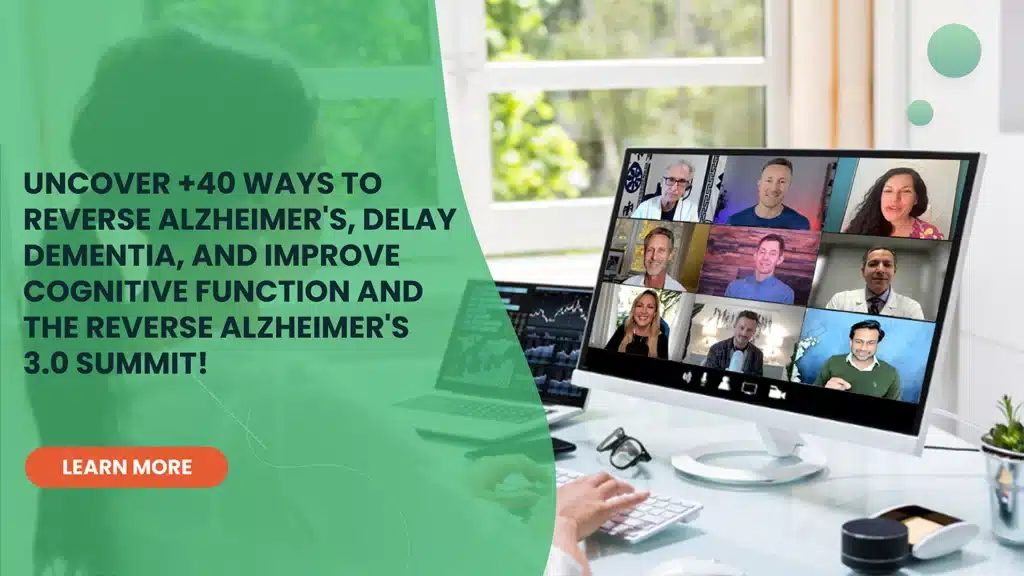|
Getting your Trinity Audio player ready...
|
A healthy brain that can build precious memories is key to living a happy life.
As we grow older, many of us develop diseases that affect our memories and brain function.
Alzheimer’s disease is one such disease that you or a loved one could experience.
Dr. David Perlmutter, a neurology expert, said patients tell him that their greatest health fear is not heart disease or cancer, it is dementia.
According to the CDC, Alzheimer’s disease is a neurodegenerative disease and is the most common type of dementia. Dementia is the broad term used to describe the diseases that cause you to lose your brain function.
In Alzheimer’s disease, the memory, thought, and language centers of your brain are the main areas disrupted. It is a progressive disease that starts with mild memory problems.
Then, it gets worse.
As Alzheimer’s disease progresses, you will slowly be unable to have conversations, solve problems, or take care of yourself.
It is devastating for the person with the disease as well as family and loved ones. People with Alzheimer’s can become unrecognizable to the person they were before it.
This debilitating disease occurs in 10% of Americans 65 and older, which is approximately 6 million people. Women account for 67% of all cases of Alzheimer’s. Estimates show that the number of people living with Alzheimer’s will triple by 2060.
On average, people over 65 live only 4-8 years after receiving an Alzheimer’s diagnosis. Yet, some live over 20 years, which shows that this disease is unpredictable. Reports from the Alzheimer’s Association indicate that at age 70, you are twice as likely to die before 80 if you have Alzheimer’s.
As scary as this disease sounds, research has been discovering new treatment methods that seem promising. These include new medications, brain stimulation, therapeutic diets, therapeutic exercise, and brain retraining.
In this blog, you will learn about how Alzheimer’s disease develops, current treatments, and prevention methods.
Exploring the Onset of Alzheimer’s Disease

Alois Alzheimer, a German neurologist, discovered Alzheimer’s disease in 1906. According to one report, Alois Alzheimer took care of a 50-year old woman who suffered from aggression, memory issues, and confusion. She died at 55, and an autopsy was performed to explore the cause of her symptoms and death.
The autopsy showed that proteins built up in the brain areas associated with thinking, memory, and personality.
Scientists have found that the main biological cause of Alzheimer’s is “amyloid-beta protein” and “tau protein” buildup. The amyloid-beta proteins form plaques and tau proteins create neuron tangles in the brain. The buildup of and lack of metabolism of these disrupts normal brain functions.
As plaques accumulate, they block cell-to-cell signaling and trigger an inflammatory response from the brain’s immune system that kills nerve cells. Twisted strands of dead nerve cells, known as tangles, also provide stimuli for inflammation.
One article has shown that the plaques formed from amyloid-beta are linked to poor cognitive functioning. This article shows that greater amyloid-beta concentrations correlate with worse memory and problem-solving.
A report from the NIH, indicates that once amyloid-beta reaches a critical point, tau will spread throughout the brain. Once tau spreads, neurons cannot communicate as well.
The Progression of Alzheimer’s Disease
What causes amyloid-beta and tau protein to build up?
One review states that it starts when flawed enzymes change “amyloid precursor protein” (APP) to create amyloid-beta. APP is a protein that is essential for your cells to keep their structure.
The buildup of amyloid-beta proteins causes plaques to form. This typically starts in the memory areas of the brain.
As we age, amyloid-beta builds up faster, according to a 2012 study.
An important review reported that “hyperphosphorylation” is the process that causes tau proteins to build up. Briefly, 2-3 tau phosphorylations occur in healthy brains, but in Alzheimer’s disease, it can occur up to 9 times and cause tangles to develop.
These tangles cause further progression of Alzheimer’s disease.
Faster buildup of amyloid-beta and tau with age is attributed to:
1) Chronic Inflammation, which can also lead to Inflammaging
2) Chronic Sleep Deprivation
3) Genetic Factors
4) Blood Sugar Dysregulation
5) Declining estrogen
6) Poor methylation
7) CVD disease
8) Diabetes
9) TBI
10) Toxin exposure, like heavy metals.
Amyloid-beta and tau proteins can naturally be cleared by your body’s lymphatic system. Cells like astrocytes and microglia are responsible for this, according to a 2022 review.
These cells are the cleaning crew of your brain. They use enzymes to break down the amyloid-beta proteins so they can vacuum them up and remove them from your brain.
Yet, as we age, these cells become less effective. With chronic inflammation and chronic sleep deprivation, the buildup of amyloid-beta increases. That, in combination with aging, can increase the rate of Alzheimer’s disease progression.

- Access the Reverse Alzheimer’s Summit 4.0
Learn from top leaders in the field the skills you need today.
Current Alzheimer’s Treatments
Although there is no cure for Alzheimer’s disease, researchers have found ways to treat symptoms. Their goal is to allow people to live with independence and dignity for longer.
According to the NIH, there are several FDA-approved medications to treat symptoms including:
· Cholinesterase inhibitors – Donepezil, Rivastigmine, and Galantamine
· NMDA antagonists – Memantine and a Memantine and Donepezil combination
· Disease-modifying immunotherapies – Aducanumab and Lecanemab
Cholinesterase inhibitors are used during mild, moderate, and severe Alzheimer’s cases. These prevent the breakdown of acetylcholine. Acetylcholine is essential for proper brain function. Deficiencies in acetylcholine can cause confusion and difficulty making or recalling memories.
Side effects of Cholinesterase inhibitors include:
· Nausea and/or vomiting
· Diarrhea
· Indigestion
· Muscle Weakness
· Weight Loss
· Headache
· Fatigue
NDMA antagonists regulate glutamate. Glutamate can be toxic at extreme levels. One study discussed that excess glutamate can cause neuron death. NMDA antagonists can limit, but not eliminate, the effects of high glutamate.
Side effects of NMDA antagonists include:
· Dizziness
· Headaches
· Diarrhea
· Constipation
· Ecchymosis
· Confusion
The last FDA-approved immunotherapies discussed in this blog include aducanumab and lecanemab. These received accelerated approval in 2021 and 2023, respectively. These are approved for treatment of mild Alzheimer’s or mild cognitive impairment.
Aducanumab and lecanemab are the only FDA-approved drugs that target amyloid-beta plaques.
Reports show that aducanumab can reduce amyloid-beta plaques. But unfortunately, aducanumab did not improve the symptoms of dementia or quality of life, according to one report.
This indicates that reversing plaque buildup may not be the solution to treating Alzheimer’s disease. It is likely that the damage was already done once the plaque built up.
It is important for you to know that during clinical trials, brain swelling was reported in 41% of patients taking aducanumab. One to two percent of the patients either had long-term issues or needed hospitalization.
Lecanemab was assessed in a clinical trial that had 898 patients receiving lecanemab and 897 receiving a placebo.
The findings indicated that lecanemab reduced amyloid markers in early Alzheimer’s and a small improvement in cognitive decline. It did not eliminate cognitive decline, however.
It is important for you to know that 26.4% of those receiving lecanemab had reactions to it and 12.6% had amyloid-related imaging abnormalities with edema or effusions.
As the treatments appear to have limited effectiveness, we must take as many steps as possible to limit the risk of developing Alzheimer’s disease.
Take the Steps to Prevent Alzheimer’s
Because Alzheimer’s disease cannot be cured with current treatments, you should take steps to prevent it.
Changing your lifestyle is the most effective way to prevent Alzheimer’s.
A key review identified 5 key lifestyle factors that can reduce your risk of Alzheimer’s disease. These lifestyle factors are:
1) Over 2.5 hours per week of moderate or vigorous exercise
2) No Smoking
3) Light to moderate alcohol consumption
4) Anti-inflammatory diet
5) Keeping your mind active
If you do 4-5 of these, you can reduce your risk of Alzheimer’s disease by 60%. Doing 2-3 reduces the risk by only 37%.
In addition to reducing your risk of Alzheimer’s, exercise is known to improve your mental health. It also can keep your blood pressure and blood glucose levels under control.
No smoking and little alcohol consumption reduces inflammation and the risk of developing heart, lung, or liver diseases.
A healthy diet can also play a key role in keeping your blood pressure and blood glucose under control. It can also reduce inflammation and maintain a healthy microbiome.
The key diet that is suggested by the NIH is the Mediterranean-DAHS Intervention for Neurodegenerative Delay (MIND) diet. This diet alone was found to reduce Alzheimer’s risk by 35-53%.
Keeping your mind active might seem like a broad lifestyle factor. It simply means that you should talk with people, play games, challenge yourself with puzzles, or even try to learn new information.
Getting enough sleep is also critical.
Consistently sleeping less than 6 hours at ages 50, 60, and 70 was found to increase the risk of dementia by 30%.
Modifying all of these aspects of your life at the same time could be hard. Starting with small steps is the best way to change your habits.
It may be easiest to start with one change and then move onto the others.
With this information, you should feel confident that you have the knowledge and ability to change your life and prevent Alzheimer’s disease.
Daniel Chantigian, MS, is exploring Alzheimer’s Disease. This blog is the first of a three-part series.
References
- CDC. (2020). Alzheimer’s Disease and Related Dementias. CDC; CDC. Read it here.
- Alzheimer’s Association. (2021). Facts and Figures. Alzheimer’s Disease and Dementia; Alzheimer’s Association. Read it here.
- Matthews, K. A., Xu, W., Gaglioti, A. H., Holt, J. B., Croft, J. B., Mack, D., & McGuire, L. C. (2019). Racial and ethnic estimates of Alzheimer’s disease and related dementias in the United States (2015-2060) in adults aged ≥65 years. Alzheimer’s & dementia : the journal of the Alzheimer’s Association, 15(1), 17–24. Read it here.
- Hippius, H., & Neundörfer, G. (2003). The discovery of Alzheimer’s disease. Dialogues in clinical neuroscience, 5(1), 101–108. Read it here.
- Rodrigue, K. M., Kennedy, K. M., Devous, M. D., Sr, Rieck, J. R., Hebrank, A. C., Diaz-Arrastia, R., Mathews, D., & Park, D. C. (2012). β-Amyloid burden in healthy aging: regional distribution and cognitive consequences. Neurology, 78(6), 387–395. Read it here.
- National Institute on Aging. (2017, May 16). What Happens to the Brain in Alzheimer’s Disease? National Institute on Aging. Read it here.
- Tiwari, S., Atluri, V., Kaushik, A., Yndart, A., & Nair, M. (2019). Alzheimer’s disease: pathogenesis, diagnostics, and therapeutics. International journal of nanomedicine, 14, 5541–5554. Read it here.
- National Institute on Aging. (2021, July 8). How Is Alzheimer’s Disease Treated? National Institute on Aging. Read it here.
- Sam, C., & Bordoni, B. (2020). Physiology, Acetylcholine. PubMed; StatPearls Publishing. Read it here.
- Schubert, D., & Piasecki, D. (2001). Oxidative glutamate toxicity can be a component of the excitotoxicity cascade. The Journal of neuroscience: the official journal of the Society for Neuroscience, 21(19), 7455–7462. Read it here.
- Woloshin, S., & Kesselheim, A. S. (2022). What to Know About the Alzheimer Drug Aducanumab (Aduhelm). JAMA Internal Medicine, 182(8), 892. Read it here.
- van Dyck, C. H., Swanson, C. J., Aisen, P., Bateman, R. J., Chen, C., Gee, M., Kanekiyo, M., Li, D., Reyderman, L., Cohen, S., Froelich, L., Katayama, S., Sabbagh, M., Vellas, B., Watson, D., Dhadda, S., Irizarry, M., Kramer, L. D., & Iwatsubo, T. (2023). Lecanemab in Early Alzheimer’s Disease. The New England journal of medicine, 388(1), 9–21. Read it here.
- Dhana, K., Evans, D. A., Rajan, K. B., Bennett, D. A., & Morris, M. C. (2020). Healthy lifestyle and the risk of Alzheimer dementia: Findings from 2 longitudinal studies. Neurology, 95(4), e374–e383. Read it here.
- National Institute of Health. (2020, June 17). Combination of healthy lifestyle traits may substantially reduce alzheimer’s. National Institutes of Health (NIH). Read it here.
- Morris, M. C., Tangney, C. C., Wang, Y., Sacks, F. M., Bennett, D. A., & Aggarwal, N. T. (2015). MIND diet associated with reduced incidence of Alzheimer’s disease. Alzheimer’s & dementia : the journal of the Alzheimer’s Association, 11(9), 1007–1014. Read it here.
- Robbins, R., Quan, S. F., Weaver, M. D., Bormes, G., Barger, L. K., & Czeisler, C. A. (2021). Examining sleep deficiency and disturbance and their risk for incident dementia and all-cause mortality in older adults across 5 years in the United States. Aging, 13(3), 3254–3268. Read it here.







This blog post offers a poignant reminder of the impact Alzheimer’s can have, not just on those diagnosed but also on their loved ones. It’s heartening to read about advancements in treatment and prevention. The emphasis on lifestyle changes for prevention is particularly valuable, shedding light on how we can proactively care for our brain health. Thank you Dr. Heather Sandison for hosting our Reversing Alzheimer’s Summit! https://drtalks.com/reverse-alzheimers-summit/
Seeing how it affects folks up close and personal, it’s like a wakeup call to really get why we need to get how it ticks – from how it starts to what we can do about it. Dr. Perlmutter’s stories? They hit home, showing just how scary losing your mental sharpness can be. Makes you appreciate those clear-headed moments, you know?
And when you start piecing together how Alzheimer’s sneaks up on you, from those pesky amyloid-beta and tau proteins to stuff like how you live day to day, it’s like a rollercoaster of emotions. Sure, there’s some hope with treatments and lifestyle tweaks, but man, the unknowns are a bit nerve-wracking. Still, knowing we’ve got some tools in our belt, like staying active, eating right, keeping sharp mentally, and catching those Z’s, it’s like a small ray of sunshine in the fog. After chewing over all this info, I’m feeling pumped to take charge of my noggin’ health and be there for my peeps on the Alzheimer’s avoidance train.
Having lost my grandfather to Alzheimer’s a decade ago and witnessing the challenges it brought to my family, and now with my father nearing 70, this topic hits close to home.
The emphasis on prevention through lifestyle changes is particularly
meaningful to me and a much needed reminder how we have agency in mitigating
our risks through exercise, diet, and mental stimulation.
I appreciate resources like this blog series for empowering individuals
to prioritize brain health. Thank you for sharing, Dr. Sandison!